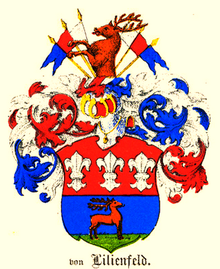Jakob Heinrich von Lilienfeld
Jakob Heinrich (I.) von Lilienfeld (born November 20, 1716 in Addina , Estonia , † July 1, 1785 in Riga ) was a Baltic nobleman , Prussian chamberlain , writer and poet .
Life
He began his military training around 1733 in the Land Cadet Corps in Saint Petersburg . From 1741 to 1743 he was an embassy cavalier at the Russian diplomatic mission in Paris .
As a result of the exile of the wife of his older brother Karl Gustav d. J. to Siberia , he was recalled from his diplomatic post. He decided not to continue his service in the Imperial Russian Army and was dismissed as a major . Then he lived on the Estonian estates and settled in Neu-Oberpahlen in 1746 . During his writing activities he was in contact with the Baltic Enlightenmentists August Wilhelm Hupel , Friedrich Konrad Gadebusch and Christian David Lenz and developed into a socially critical writer who cared about the social reforms in the Baltic States . He was a Holstein Budget Councilor and later a Privy Legitimate Councilor .
Origin and family
Jakob Heinrich came from the Baltic noble family von Lilienfeld . His father was Karl Gustav (the elder) von Lilienfeld (1682-1738), who was married to Sophie Gertrud von Rosencron. The older brother of Jakob Heinrichs was the Russian chamberlain Baron Karl Gustav (the younger) von Lilienfeld (1711-1759). Jakob Heinrich married Christina von Fick in 1746, she was the heiress of Neu-Oberpahlen and Kawershof, her descendants were:
- Karl Magnus von Lilienfeld, Lord of Neu-Oberpahlen
- Aurora Maria von Lilienfeld, married. by Rönne
- Christine Jakobine von Lilienfeld, married. from Sivers
- Peter von Lilienfeld
- Margareth von Lilienfeld
The European idea
The idea of a European federation of states with the aim of the peaceful settlement of disputes between states before a European court , described in his work "Neues Staats-Gebäude" (New State Building) from 1767, found a lively response in contemporary political law studies, but was then forgotten and was only rediscovered in 1997. The core of his idea was to limit the arbitrariness of the princes at that time. He drafted a peace draft for a peaceful, free and federal Europe, in which a court of law should limit the power of the rulers to the extent that they cannot ruin the peoples through extortion and the consequences of war.
Works
- Werner Preuss (editor): Jakob Heinrich von Lilienfeld (1716–1785): A selection from his works. Paperback, 326 pages, Röhrig Universitätsverlag, St. Ingbert 1997, ISBN 3861101378
- New State Building, in three volumes (Leipzig 1767) [6]
- In 1758 the five-act comedy “Der Neujahrs-Wunsch” by Jakob Heinrich von Lilienfeld was given in Reval . This play became very popular in the Baltic States and Lilienfeld is known as the first Baltic playwright . In 1766 he published the piece "Uranie or The Relationship of Love and Friendship", other works were:
- The strength of world wisdom (handwritten legacy)
- Attempt at a new theodice (Riga 1778)
- Treatises on the price question of the Imperial Free Economic Society in Saint Petersburg, concerning the property and freedom of the peasants
- Essay with a plan to promote Livonia's fortune (presented to Livonian knighthood in 1780)
literature
- Carola L. Gottzmann / Petra Hörner: Lexicon of the German-language literature of the Baltic States and St. Petersburg . 3 volumes; 1 Verlag Walter de Gruyter, Berlin 2007. ISBN 978-3-11-019338-1 . Volume 2, pp. 838-839.
Web links
- Baltic Historical Commission (ed.): Entry on Jakob Heinrich von Lilienfeld. In: BBLD - Baltic Biographical Lexicon digital
- Lilienfeld, Jakob Heinrich von. Entry on Slavic Studies, University of Potsdam .
- Werner H. Preuss: Jakob Heinrich von Lilienfeld (1716-1785), the Baltic poet and political writer.
- [7] General encyclopedia of writers and scholars of the provinces of Livonia, Esthland and Courland
Individual evidence
- ↑ The ambassadorial cavaliers had preferably only to render honorary services. Source: Brockhaus Bilder-Conversations-Lexikon auf Zeno.org [1]
- ^ Baltic Historical Commission (ed.): Entry on Christian David Lenz. In: BBLD - Baltic Biographical Lexicon digital
- ↑ Senior civil servant in a government. In: German Encyclopedia [2]
- ↑ Werner H. Preuss: Jakob Heinrich von Lilienfeld (1716–1785), the Baltic poet and political writer. [3] ( Page no longer available , search in web archives ) Info: The link was automatically marked as defective. Please check the link according to the instructions and then remove this notice.
- ↑ Carola L. Gottzmann, Petra Hörner, Lexicon of German-Language Literature of the Baltic States and St. Petersburg: From the Middle Ages to the Present, Verlag Walter de Gruyter, 2007, ISBN 3110912139 , page 82 [4]
- ↑ the last four works see: Johann Friedrich von Recke , General Writers and Scholars Lexicon of the Provinces of Livonia, Esthland and Courland , Volume 3, Verlag Steffenhagen, 1831, original from the Austrian National Library, digitized Jan. 9, 2014, page 69 / 70 [5]
| personal data | |
|---|---|
| SURNAME | Lilienfeld, Jakob Heinrich von |
| ALTERNATIVE NAMES | Lilienfeld, Heinrich I. Jakob von |
| BRIEF DESCRIPTION | Baltic nobleman and writer |
| DATE OF BIRTH | November 20, 1716 |
| PLACE OF BIRTH | Addinal , Estonia |
| DATE OF DEATH | July 1, 1785 |
| Place of death | Riga |
